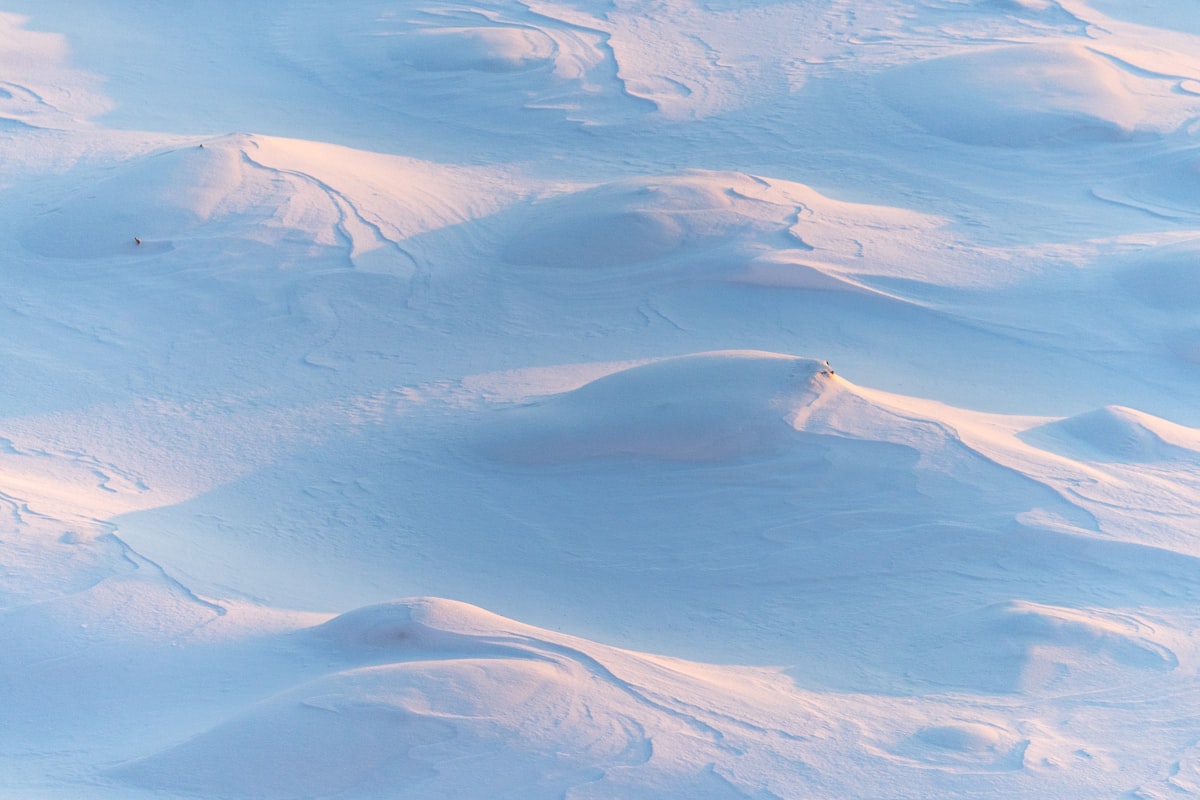Snow I: Drift
Life doesn't always have a particular direction.

Good morning. Today begins the first décade of Nivôse, Year CCXXXII. It's the month of snow. Our theme this time is drift.
Do things change, or do they cycle? Is movement directional, or a great spiral within itself? Are systems open, or closed? Snowdrifts pile up against an object as the wind – itself a timeless swirl of heat exchange with no origin and no destination – moves the snowflakes from this place to that. What began in the quiet windless snowfall that made your cocoa taste good and your heart feel peace, becomes, overnight, a disturbed surface where the bushes are now miniature mountains and the yard has a curious divot in one corner. The drifts will melt more slowly, serving as a reminder, when snowless day after snowless day slowly erodes the evidence of this meteorological miracle, that something happened, albeit briefly, before status quo is melted back into reality. The drift was an illusion, but a tangible one. So was the change real? Or was its temporary nature a self-nullification? Good morning. Let's get heavy.
Drift is a passive shift, often understood as an involuntary one, where the course that was set or the life that was created is somehow nudged from its true heading by the interference of outside – and often invisible – forces. Contrast this with change, that active concept in which will and strength are used to make and do. When something or someone drifts from a path, this is seen as an opposite, a lack of will and strength, a failure to make and do, even though drift can lead to as much dramatic alteration as change. Change is good, change is inevitable; drift is bad, drift needs correction.
Why?
I've become fascinated in recent years by the power of serendipity, and the subtle but persistent effort by our technocratic society to eradicate serendipity from our lives and replace it with an ersatz force, one that has been calculated and can have its levers pulled by the power of money.
True serendipity – that delightful moment when you encounter something new and unexpected that nonetheless becomes instantly familiar and necessary – is a love-at-first-sight emotion that conjures some of our most powerful life moments and generates some of our most meaningful life decisions.
Achieving something you want is wonderful, but it often leaves an immediate hollow in its wake, and a desire to achieve that thing again. Here's Russell Wilson, an NFL quarterback, talking about what it was like to win a Superbowl.
His coach at the time, Pete Carroll, reinforces and praises Wilson's worldview.
This is a common viewpoint among athletes, often indoctrinated deliberately and upheld as the reason superstars and champions become superstars and champions. It's also a bit mad, isn't it? Wilson even says, "call me crazy." I won't go that far, but it does sound, when you strip away the implicit undertone of the moral "good" of unceasing work ethic, like a miserable way to live. Wilson's posture and facial expressions have a subtle misery and weariness to them. All he can think of is the next one. This is having a goal? This is trying to improve and change? Ask yourself: when was the last time you saw an interview with a retired all-time great athlete and they seemed content?
Contrast this with serendipitous moments. While there's an aspect of creation to being in the right place at the right time – you cannot experience serendipity when you cosset yourself within the familiar – they happen like lightning, with little warning and tremendous impact. Serendipity is sometimes called luck, but it's a luck that was unsought. It's not a happy gambler's mathematical luck, but a happy child's I-made-a-new-best-friend-at-the-playground luck. When people reflect on the happy accidents of their lives, they never say "all I wanted after that was for it to happen again." They won't seem miserable. You won't hear talk of grinding and striving and sweating and toiling. You'll hear, instead, gratitude.
Serendipity is an engine of gratitude, and gratitude is one of the most calming forms of love we experience. If you believe, as I do, that love is purpose of life, then serendipity, for all its uncontrollable and inexplicable nature, is closer to the point of living than anything we consciously try to do. Drifting is the point.
I don't mean to overplay this. As I glanced at earlier, serendipity requires a certain level of immersion in the unfamiliar, and purposefully trying to do something is the best way to motivate ourselves into that zone of discomfort. Purpose has a purpose. Change born of deliberate work is also necessary in a healthy and satisfying life. But we need to shed our unquestioning moral viewpoint on change being good and drift being bad. It's not just a philosophical question. It's becoming an economic and spiritual one.
For our entire existence as a species, we have lived within the system of Earth's natural environs. Our minds and spirits and bodies have grown in reaction to that environment, adapting to its vagaries and harshness. I believe its that deep adaptation that had led to our positive emotional response to serendipity. Something evolutionary within us recognizes that it's the accidental fortunes (and misfortunes) that have the most impact on our survival, and are therefore the most worthy of our focus. The irony, then, is that our current inventive push is toward creating a machined system that will eradicate (or cynically manufacture) serendipity.
Algorithms, machine learning, and the entire ecosystem of the internet have become perverted by the ethic of controlled encounter. What began as the ultimate tool for facilitating serendipity (as anyone who patrolled the wild web of 30 years ago can attest) has been twisted into anvil upon which only our conscious desires our fed. Say a product and its ads will appear. Join a social community and only link up with people you know. If you liked this, you'll like that.
The scary part is that these systems are attempting to give the appearance of serendipity. The better they are at mimicry of natural serendipity, the more successful they become as businesses. The rise of TikTok was predicated entirely on how well its algorithm guessed at which seemingly random videos you'd enjoy with very little input to get it going. And these programs are indeed getting quite good, speeding through the current uncanny valley to an unknown future state where we won't be able to recognize the difference between manipulated mathematical "serendipity" and the real thing.
But the difference will still be there. In life, when serendipity happens, the most common power attributed, even by the non-religious, is God, the higher power, the universe. We recognize it as the work of something vast and unknowable.
But algorithms and AI will not be allowed to become quite so vast as to be unknowable. Even though machine learning programmers will readily admit they don't know exactly what math is taking place when a program programs itself by brute force iteration, they will still be sure to point out that they "correct" any results that seem too unexpected or too unlike the status quo of reality. The goal is to make programs that can yield results some human – somewhere – wants. Algorithmic serendipity is false because it is the outcome of the desire of some corporation or salesperson or business. It is human-generated. We believe that AI and ML are cool because they take our hands off the wheel, but what steers our life instead is not God, but simply some other driver. One we don't know. One whose motives are obscured by the razzle and also the dazzle.
We didn't evolve to be manipulated by each other. Our bodies and spirits are not driven to survive simply in order to be subordinate to one of ... us. Human beings yearn to survive to experience freedom, and in this context that means subordination to the huge incalculable forces of the universe, the passive power so much greater than our meager species, or indeed, anything we could possibly comprehend.
Keep an eye out for the difference in this rapidly changing world. Know the difference between when you're pleasantly drifting along with an open heart, and when you're coldly being shoved into the grasp of a business's machine.
A 20-year-old lad in Germany wrote a quick message including his address, stuffed it into a standard beer bottle, and hucked it into the Baltic Sea. A century later, that same bottle was recovered in Kiel, on that same Baltic sea, and presented to his granddaughter, who still lived in the area. It's considered to be the oldest message-in-a-bottle delivered to a recipient, so that's something neat that happened this year. Helping the chances of success are the swirling currents of the Baltic Sea, which apparently have the darndest time escaping that cold whirlpool north of Europe.
The cold oceans don't move much. The second-oldest was an oceanography experiment dropped off the coast of Scotland, and 94 years later it washed up a mere nine nautical miles away. Contrast this with the kite surfer in Croatia who found a busted bottle on beach and a love note inside from Jonathan to Mary that was apparently hurled off the coast of Nova Scotia, Canada.
Sometimes the bottles lead to media sensations, such as the story of an American serviceman during the end of World War II who, lonely at Christmastime on his ship, tossed a note overboard with his address. It was discovered by a lass in Ireland eight months later, and she wrote to the lonesome man in uniform. The correspondence blossomed over the years, finally prompting our veteran to fly across the Atlantic seven years later and go on a date with his Dingle lady. The newspapers were all over the romance – a sort of ancient mariner's Bumble date – but despite the public's overwhelming desire for a happy ending, the courtship was merely meh and the two did not live happily ever after together, parting as friends instead.
I spent more time than I ever thought I would in the driftwood sculptures section of Etsy to get an idea of how this singular material has become a source of artistic inspiration, and I've come away with one strong impression: do not, ever, for any reason, carve a human face into a piece of driftwood, unless you intend to terrify children.



I should say I came across many beautiful driftwood sculptures, including of the human form, and if these particular pieces are up your alley, by all means, please do click those links and purchase. I'm just saying it wouldn't be hard to have the nightmares I've been having ever since I saw them.
Recipe Challenge
Nothing this month is edible. Instead, we build!
When putting together a seasonal calendar for a region that has a winter, the makers will inevitably face some winter stretches when nothing is in season. Fabre d'Eglantine and Gilbert Romme decided to cram this problem into Nivôse, eschewing vegetables (and their living counterparts) with minerals (and their non-living counterparts). As a result, we will be fasting. Instead, here's some things that could (theoretically) be made with this décade's objects.
An everlasting bonfire: Coal and peat are both very smoky fuels that put out horrendous noxious gasses as far as air quality goes, so I strongly do not encourage building this bonfire, but ... if you did, you could probably keep it going indefinitely with a little bit of tending. Just think of that poor coal mine in Centralia, Pennsylvania.
A pointless explosive: Saltpeter (or potash) is a great fertilizer, but if you mix it with manure, you can arrive by various steps at gunpowder, which was probably why both of these objects are included in this revolutionary propaganda. Add sulfur to the finished product and you'll have a firework for the olfactory senses, albeit one with a small radius and unpleasant results.
A lumpy patio: Before modern ashpalt and cement were perfected, but after the desire for roads to be less bumpy and cobbly and muddy became acute, places like Paris were experimenting with paving methods that used a layer of igneous rock (for drainage and height above the soil) topped with a layer of bitumen, the main ingredient in asphalt to this day. The results were rather more uneven that we can achieve with modern steamrollers, but still represented a luxurious upgrade for carriage wheels on par with electrical streetlamps. At least, before the potholes happened...
Semi-automatic brush clearing machine: This probably won't work, but I've made some exploratory sketches, and I believe that if you can somehow convince a squirrel to remain in your yard, you could attach a flail to the tail of your dog and have the inevitable frantic chase take out all the brambles and dead bushes that have set up shop since the drop in temperatures pushed everything into dormancy. Yes, you did catch me looking outside at the yard and wishing someone would just clear it all away so we can start over in spring.
Score: 10/10. It's easy when you use a little imagination!
Card Reading

As we turn into bleak midwinter we find our deck (mostly) drained of color. Our query this week is regarding the way we believe an antagonist (king of spades) is creating a new financial obligation (ace of diamonds). While life muddles along on the outside (6 of hearts), inwardly this holiday season has us stressed out to the max about bills and the financial prospects in the coming year (3 of diamonds). We've just had some major expensive life events land in our lap (3 of clubs) and we know we need to be ready and steady for the long haul facing forward (9 of clubs).
The source of that steadiness is going to be a new figure in our lives (jack of clubs). This isn't a new source of income or someone who will lend us money. The diamonds have left the spread, so we need to trust that money will take care of itself. Instead, we must seek stability and comfort from a new source, whether that's a therapist, a group, an old friend we haven't connected to in a while – anyone we haven't been leaning on this whole time already. Look especially to your past personal life (2 of hearts) and try make reconnections. The key card is adamant that this is the only way to gain the perspective necessary (2 of spades) to release this antagonist's grip on our emotions. (Always remember, an enemy is only an enemy if we make them one in our hearts and minds.) In the end, the road may still be bumpy ahead, but we'll feel lucky and safe (8 of hearts) in our personal lives.
Something Fun
Train charges face-first into two-story snow drift (49sec)
You got this, you got this, you got this, you ... oh.



